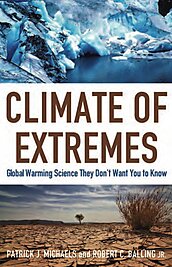There’s a whole new world of global warming science today, but few people hear about it. In recent years, an internally consistent body of scientific literature has emerged that argues cogently for global warming but against the gloom-and-doom vision of climate change. But those who merely call attention to this literature are intimidated, blacklisted, and even driven from prestigious scientific employment. Calling the current scientific environment a “climate of extremes” is an understatement.
It’s a fact that there are fewer citations in the refereed scientific literature providing evidence for the moderate view of global warming, but that’s to be expected. In Climate of Extremes, climatologists Patrick J. Michaels and Robert Balling Jr. explain that climate science is hardly unbiased, even though the global climate community itself believes that any new finding has an equal probability of making our climatic future appear more or less dire.
Michaels and Balling examine all aspects of the apocalyptic vision of climate change making headlines almost every day: Hurricanes pumped up by global warming, rapid melting of Greenland and Antarctica resulting in 20 feet of sea-level rise in the next 90 years, that global warming is occurring at an increasing pace, and there is a massive increase in heat-wave related deaths. Each one of these pop-culture icons of climate change turns out to be short on facts and long on exaggeration. People who read Climate of Extremes will emerge well-armed against an army of extremists hawking climate change as the greatest threat ever to our society and way of life.
